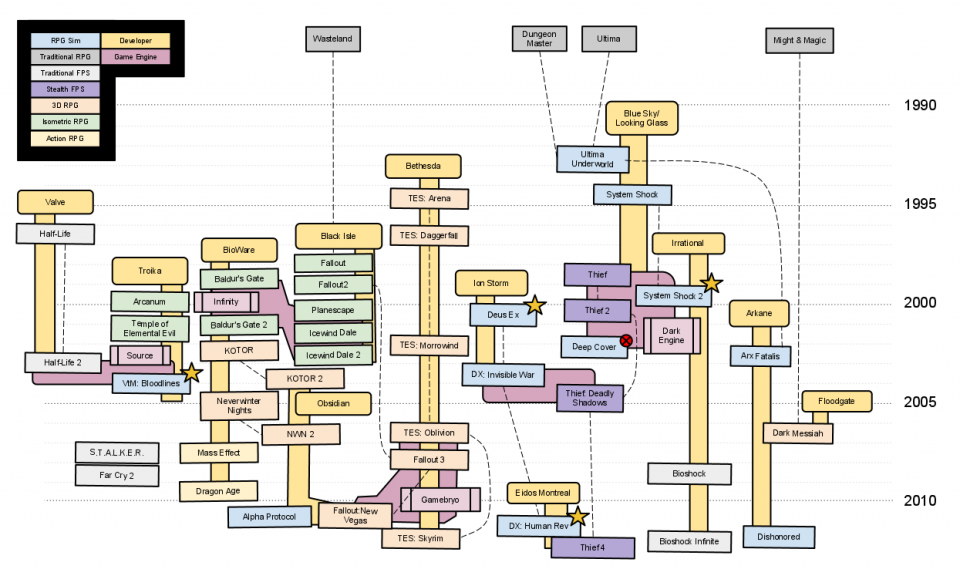Simulation RPGs and the CRPG/FPS/PC Stealth Family tree
By oraknabo 5 Comments
I've replayed a ton of old PC games lately, mostly thanks to GoG.com, and I started thinking about how this really great style of simulation-based RPG grew out of basically Ultima Underworld and then mostly disappeared. So I started screwing around with this timeline/family tree to sort it all out. I ended up adding a bunch of other CRPGs in for context and a few FPS games that I feel relate. I don't know if this is 100% done. Some of my labels may be controversial, but whatever. Feel free to discuss and give feedback. Dates are approximate, but close enough to see what existed before what.
I have a few comments on specific games after the image.

"Immersive Simulation" RPGs
There are a lot of arguments over what is and isn't an RPG and I'm not really trying to get into that. "Dungeon Simulation" was originally used by Paul Neurath to describe what he was trying to create with Ultima underworld. The idea was a game that falls somewhere between a traditional RPG and a flight simulator--a game that offers players a "pallette of strategies" to chose from in a style of gameplay now better known today as "emergent". Warren Spector mostly gets the credit for this style of gaming and he deserves a lot of it because he was involved heavily at Origin Systems, produced a bunch of the games created by Blue Sky & Looking Glass and went on to "perfect" what they were doing in Deus Ex, but I also think Neurath and Doug Church deserve the bulk of the credit for setting the standards for this flavor of game with Underworld and System Shock and even Thief which, though it's not an RPG, is a systems-based simulation stealth game. The things that define these games most are an emphasis on open, intricate level design, multiple approaches to solving problems and systems that create a sense of a living world. Some have different degrees of traditional RPG systems, such as dialogue systems and character building schemes, but the focus on environment, simulation and choice in play style are key to all of these. Most choose to be from first person perspective, but that seems to be an attempt to push immersion more than a requirement. Another interesting common characteristic to all of these is stealth, but I guess without it the strategic options available to the player would be a lot more limited.
Deus Ex: This game has basically become the gold standard for the type of game I'm describing. It's somewhat dated and a little hard to get into today, but it has a great balance of the systems that were started with Ultima Underworld and the System Shock games and the kind of hub area structure that Fallout did so well. It also brings in a simpler form of the stealth and the NPC behavior from the Thief games. Sure there's not much of a character system like in a traditional RPG--the game offers a choice between a few models for JC Denton but not much more at the start--but the real customizations come from the augmentations you apply and the decisions you make in the game.
System Shock 2: This game is much less about interacting with NPCs than most of the rest on this list, but I feel like its balance of systems, the choices it gives you to focus on combat, tech and psionics, its direct relationship to Ultima Underworld and its great atmosphere place it squarely under the simulation RPG label. One system I really love in this game is research and I wish other games would do something like it. XCOM and Metroid prime had nice research systems, but SS2's has a really immersive feel to it. The closest thing among these games I can think of is Alpha Protocol's dossier system, but it doesn't interest me as much. While Bioshock gives you a lot of neat ways to combine attacks, set up traps and make moral choices, I feel like it dials back too much on character building. While it's a superior example of an FPS, it's definitely more FPS than RPG. Bioshock Infinite may swing the pendulum back in some ways, but it seems from what I've seen to be Bioshock with the companion AI stuff from Half-Life 2: episode 1, so I'm labeling it as a traditional FPS as well.
Arx Fatalis: I am really surprised that I hadn't heard more about this in the past. This game has an incredible sense of atmosphere. It starts out as an updated version of Ultima Underworld and adds a lot of great stuff on top. The gesture magic system is quirky, but I like it. The character choices don't feel as deep as System Shock 2 and I wish it had a more in-depth conversation system, but it has a ton of little systems that add a lot, like taking raw meat off dead animals and cooking it in a fire to make it edible. This was apparently originally intended as the third Ultima Underworld title (similar to how Bethesda made Fallout 3), but when attempts to secure the rights to the the title fell through, the title and background story were changed.
VTM: Bloodlines: It's too bad this game got hurt by the Half-Life 2 source code leak fiasco and ended up being nearly unplayable at release because it was so riddled with bugs. Thanks to a great community that created the unofficial patches, you can now enjoy this game as the masterpiece it was intended to be. The combat kind of sucks, but it's hard to say anything else bad about this one. The hub areas and general atmosphere are incredible, the writing is top-notch and the clan system, perks and character building are very well balanced. Every quest also gives you a number of paths to decide how to approach it. This game has everything good about Deus Ex combined with the kind of deep dialogue system that Fallout and Arcanum did really well.
Deep Cover: Little can be said about this one, because it doesn't exist, but in my imagination, this 1960s-spy, stealth RPG might have just been better than Thief and Deus Ex combined. If you've never heard of it, there are some nice screenshots of some of the level design to be found online.
Alpha Protocol: I know there's a lot of hate for this game out there and about half of it is earned. The other half seems to come from people who never even played the game. There are certainly a lot of design flaws in this one including useless skills like toughness, BS boss fights and the fact that guns don't even really work until you're half way through but it has a lot of interesting ideas. Maybe this belongs more in the Action RPG category with Mass Effect. It doesn't really have hub areas like most of the other games listed here (just a map and central safehouse for each area) and it's 3rd-person while the rest of these are primarily first-person, but I wanted to mention this for having a really nice reputation system, the dossier system and the ability to spend money on intel that affects how your missions go.
Human Revolution: There are a ton of reviews out this week so I won't say a lot, but this game is the closest thing we have this generation as a perfect example of a simulation RPG. The addition of the Mass Effect-like dialogue options are really nice and some of the augmentations associated with it are interesting. The hub cities remind me a lot of the VTM: Bloodlines levels too, which is a really good thing. I'm not far in this and only have a few augs, but I really like what I've seen and the stealth is done very well too.
Dishonored: This game is currently in development and details are sketchy, but if it lives up to what the developers are saying about it, It might just be one the most interesting games ever made. It looks like a kind of steampunk Deus Ex from Arkane (some Looking Glass & Ion Storm people, plus the guy that designed City 17). Lots of crazy powers that can be combined in multiple ways and situations that have lots of ways to approach them.
Close Calls
Fallout 3, New Vegas and Oblivion: I am not historically a fan of Bethesda. Morrowind interests me a little, but Arx Fatalis, which was released the same year, is closer to my interests. Arena and Daggerfall were obviously influenced a lot by Ultima underworld, and they are good at making big worlds with a lot of lore, but their games are very traditional RPGs in my opinion. I had a hard time labeling their games the same as these others, so I just marked them as 3D RPGs. They made some steps with Oblivion into making things a lot more open and more simulation-heavy and I think Fallout 3 has been the closest they've gotten to the kinds of games I'm talking about here. Hopefully Skyrim will push even more in this direction.
S.T.A.L.K.E.R & Far Cry 2: I wanted to add these two just to acknowledge how close I think these two FPS games got to being simulations. They don't count as full RPGs to me, because there is no character system or dialogue options, but the focus on the open, simulation-heavy worlds and incorporation of lots of RPG elements make these really close to the kind of ideal I'm talking about.
